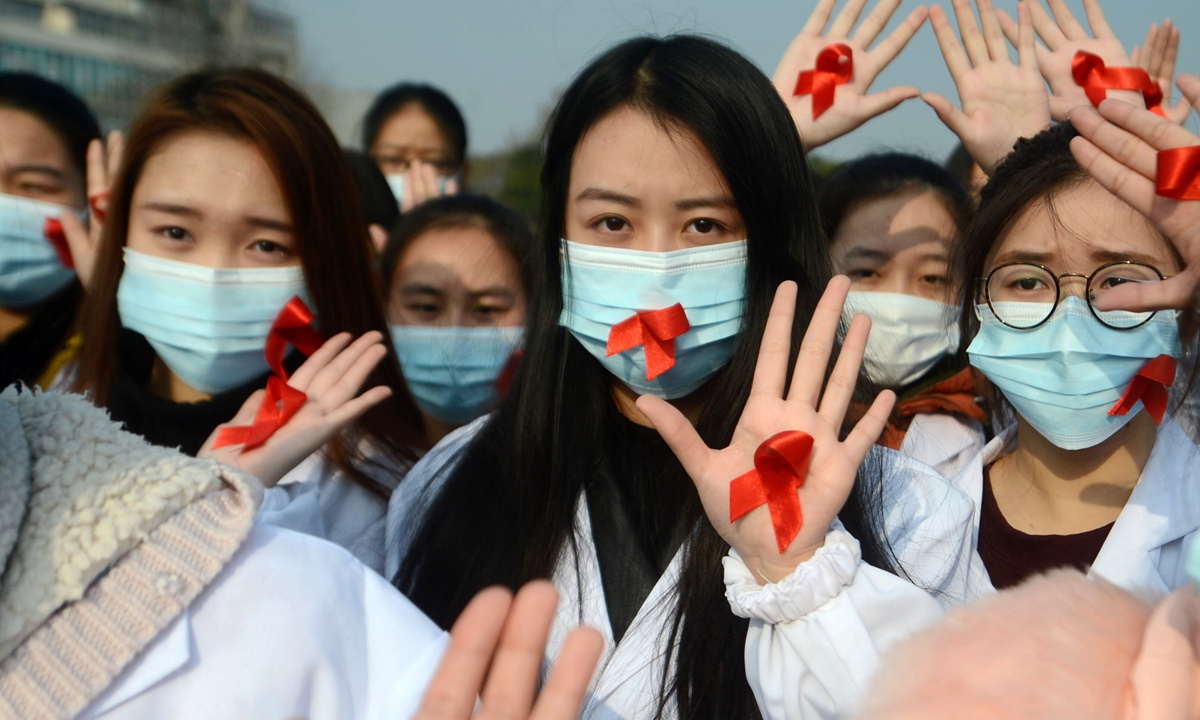Chinese colleges remain hard-hit by HIV due to discrimination and limited sex education
By Huang Lanlan, Li Qiao and Zhang Yutong Source: Global Times Published: 2020/11/30 20:58:40

Students of Yangzhou University in East China's Jiangsu Province, put red ribbon on their hands as an appeal to eliminate social discrimination against HIV patients on World AIDs Day. Photo: cnsphoto
Su Siying (pseudonym), a senior at a Beijing-based university, got tested for HIV in June after she came down with a rash and her boyfriend at the time had a persisting low fever.
She tested positive. "I cannot believe it's true," Su recalled. "I couldn't help deluding myself into thinking it was just a mistake."
While Su's condition is now generally stable with months of antiviral treatment, the virus remains a fear and uncertainty for the 20-year-old.
"I feel like walking in a swampy jungle, having no idea what lies ahead for me - a firm ground or death," she told the Global Times.
Su is among the growing group of China's HIV-infected college students. Official statistics showed that in 2018, 18.9 percent of China's young HIV patients aged between 15 and 24 were students, much higher than the 10.4 percent in 2011.
Although China has successfully halted the rapid spread of AIDS on campuses through public policy efforts, the number of young Chinese students infected with HIV remains at a high level of around 3,000 each year, Wu Zunyou, the chief epidemiologist of the Chinese Center for Disease Control and Prevention (China CDC), said on November 24, a week ahead of this year's World AIDS Day on Tuesday.
Students, especially college students, who enjoy relatively more sexual freedom than middle schoolers living with parents, are becoming a primary focus on China's HIV prevention and control work, medical experts told the Global Times, saying it is necessary and urgent to carry out AIDS and sex-related education on college campuses, commonly considered a vulnerable places for HIV.
Huge pressures
December 1st marks the 33rd World AIDs Day. Chinese Premier Li Keqiang has stressed China will improve the prevention and treatment system of AIDs, and related mechanisms. He also pledged to strengthen scientific research, ensure access to medicine, and continue working tirelessly to prevent and treat AIDs.
Many HIV-infected people, including well-educated college students, face huge pressures of being misunderstood and discriminated in society due to the ignorance and stereotypes about this disease, said some HIV patients and AIDS-related NGOs reached by the Global Times.
Even in more enlightened cities like Shanghai, sporadic cases of HIV-infected university students being isolated and even forced to quit school happen at times, said Bu Jiaqing, founder of Shanghai QingAi Health Center, a local HIV-prevention and patient-assisting NGO.
QingAi occasionally receives calls for help from desperate students who are asked to leave school after being infected with HIV. Bu shared a case in 2016, in which a Shanghai university persuaded a HIV-infected student to self-study at home and promised him a bachelor's degree. "However, he only received an associate degree after graduation," Bu told the Global Times.
The student eventually got his bachelor's degree under the help of QingAi and local media, Bu recalled.

Two female students are looking at the AIDs urine test kits in a vending machine at Southwest Petroleum University, Chengdu, Southwest China's Sichuan Province. Photo: VCG
Most HIV-infected students in college choose to hide their condition in the face of similar pressures, said QingAi member Ben (pseudonym), who is also a HIV-infected patient. "They are afraid to be kicked out of the school, or be recorded as a 'HIV carrier' in file that may affect their future career," Ben told the Global Times.
Fearing the future discrimination she may suffer in looking for a job or a partner, Su hasn't let anyone around her known her situation. "I won't tell it to my parents, either," she added. "I'm their only child. I'm scared they can't stand it."
There are still many people who view AIDS with a tinted lens today, Ben said. "They label the HIV patients as 'promiscuous,' or stay away with them out of unnecessary fear," he said. "Many believe that they can be transmitted with AIDS if staying in the same room with a HIV carrier, which is completely incorrect."
In addition to QingAi, many organizations and individuals across China are making efforts to change the public's prejudice on this disease.
Zhang Jiayin, a 18-year-old sophomore at Beijing Normal University (BNU), is busy with promoting AIDs knowledge and eliminating discrimination on campus after class. Zhang was born in Central China's Henan Province, which had once a high incidence of AIDS due to illegal blood selling scandals.
"As a child, I accepted the wrong ideas that adults told me against HIV [infectors]; but as I grew up, I realized that many of them seem to be untrue," Zhang said, adding that now she participates in the campus anti-AIDs volunteer work because she wants to learn more about AIDs, and doesn't want to see more people with AIDS discriminated against and excluded.
Unprotected sex
In China, the overwhelming majority of HIV patients were infected with the virus through unprotected sex. Among the new 1,408 HIV cases that Beijing reported in the first 10 months of 2020, 97 percent were infected through sex, of which 76 percent were through homosexual intercourse, reported China Youth Daily in November.
Unprotected sex is unfortunately common among university students. Investigations found that fewer than 40 percent of Chinese students with sex experience kept using condoms, said Han Mengjie, director of the National Center for AIDS/STD Control and Prevention under the China CDC, news site jiemian.com reported in August 2019.
Su guesses it was her then boyfriend, who "always cheated" on her and transmitted HIV to her through sex. Su later split up with the man and blocked him. "I hate him," she said.
Aside from the common unprotected sex of college students, there is the severe lack of HIV knowledge of this sexually-active group, said sexologist Zhao Meimei, a China Sexology Association member who has been working on youth sex education for four years. "They are not educated to wear condoms during the whole process of sex, nor do they know the possible consequences of unsafe sex," Zhao told the Global Times.
This is the case with a recent survey of Chinese college students' sexual and reproductive health, which covered 1,764 colleges in China's all provincial-level regions as well as Hong Kong, Macao and Taiwan. It showed that respectively 23.36 percent and 14.4 percent of students at universities didn't use condoms in their first and latest sex experience.
"[Unprotected sex] is an irresponsible behavior," notified the report of the survey, which was released in May by institutions including China Family Planning Association (CFPA).

Student volunteers from Taiyuan University of Technology in North China's Shanxi Province demonstrate how to use condoms to students on campus. Photo: IC
The millions of Chinese college students are therefore a main target of the country's AIDS-prevention work. Apart from top-down education, experts and front line volunteers reached by the Global Times said that many universities across China have built their in-campus HIV-prevention student groups, attempting to promote the knowledge of safe sex among their peers.In Lanzhou University in Northwest China's Gansu Province, for instance, the student organization Red Ribbon Club puts condoms and brochures with AIDS-prevention knowledge into bags, and sends the bags to student dormitories, club director Tong Haobin, told the Global Times.In Northeast China's Liaoning Province, student volunteers at Shenyang Jianzhu University distribute free HIV self-test kits to other students. "We sent some 400 kits last year," volunteer Guo Ziyang said to the Global Times.
Break the taboo
Shao Yiming, chief expert on AIDS, Chinese Center for Disease Control and Prevention, praised the general progress of AIDS prevention and control education in Chinese universities. The knowledge sharing speeches, publicity of AIDS prevention and control for college students in recent years is good and optimistic, he said.
Enterprises and social organizations are also helping out. Danlan Public Interest Fund, a foundation under China's biggest gay dating app owner BlueCity, is cooperating with Chinese Foundation for the Prevention of STD and AIDS (CFPSA) in "strengthening HIV prevention efforts among Chinese youth," said BlueCity.
Nonetheless, China's relatively underdeveloped sex education and traditional taboos about sex are still leading to the rise in HIV infections on campus, Shao said, calling domestic educators and parents to break the taboo.
The current Chinese college students are a Gen-Z group with more open mind about sex than any of their predecessors. According to the CFPA's survey report in May, 88.54 percent of students at universities said they accept or at least don't oppose premarital sex, and every student with sexual experience has had 3.14 sex partners on average.
Among the 170 college students reached by the Global Times over the weekend, more than 90 percent said they or some of their surrounding peers have had sexual experience. "It's normal for those in a relationship to have sex life, which makes up a part of daily life," one said.
Many universities' sex education, by contrast, has sadly lagged behind their students' sexual practice, said Zhao. "Some schools still carry out education by stigmatizing sex and extolling chastity, threatening students, especially female students, to keep away from sex," she sighed.
In 2015, a university in Northwest China's Shaanxi Province reportedly asked female students to promise not to have sex before marriage. Earlier this year, a bulletin board at a secondary school in Central China's Henan Province caused heated debate for posting sexist contents such as "the offspring of a woman who is loyal to her husband will be smarter than her," thepaper.cn reported in July.
Bu and QingAi are trying to change that. In promoting AIDS-prevention knowledge among college students, Bu said he usually focuses on practical skills of protecting oneself from the disease, such as taking PEP (post-exposure prophylaxis) drugs to prevent HIV after a possible exposure.
"We seldom talk about the moral or social issues behind it," Bu told the Global Times, saying sex education is like teaching people to drive. "Driving can be dangerous sometimes, but what we should do is to teach them safe driving, rather than simply kicking them out of cars."
China's State Council issued the Health China Initiative (2019-2030) in 2019, which clearly states that the overall HIV and AIDS infection rate should be below 0.15 percent and 0.2 percent by 2022 and 2030, respectively.
Newspaper headline: Safety above stigma
Posted in: IN-DEPTH